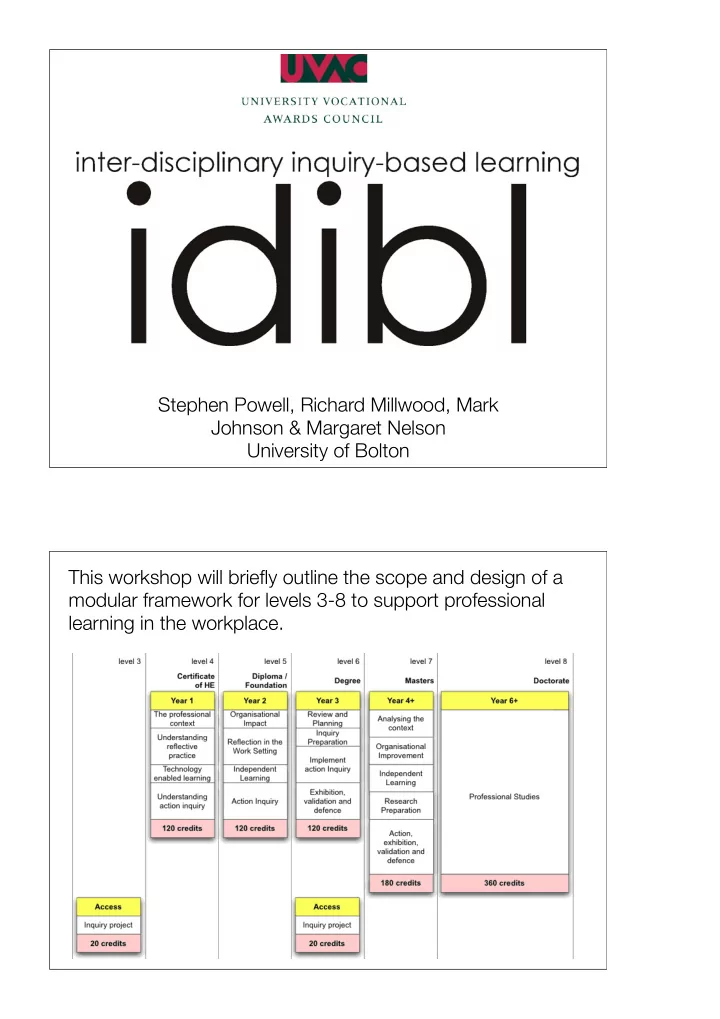

Stephen Powell, Richard Millwood, Mark Johnson & Margaret Nelson University of Bolton This workshop will briefly outline the scope and design of a modular framework for levels 3-8 to support professional learning in the workplace.
OUTLINE OF THIS WORKSHOP When such personalisation of learning is achieved, there are new costs – this workshop will discuss what these are and how they have been successfully overcome ... ...and invite participants to question the presenters and debate the issues that arise. The Inter-Disciplinary Inquiry-Based Learning Project (IDIBL) project was initiated in August 2007 and sets out to reach students for whom traditional university courses do not fit.
2003 2004 2005 2006 2007 2008 August 2007 January 2003 • IDIBL project starts • Ultraversity project starts May 2008 May 2003 • Validated new framework & • Ultraversity validated Masters in Learning with Technology July 2003 • Ultraversity recruits 300 September 2008 students • Recruited 9 students for Masters LwT July 2006 • Masters module is CPD for • Ultraversity graduates 148 new staff in UAE students November 2008 2005 • Validated Regeneration & • Ultraversity revalidated for Sustainable Communities 15-30 credit restructure • UVAC! February 2006 Future developments • Bournemouth MA Creative • Top-up from Foundation Media Practice validated degree to Bachelors in Nursery Education Within the project, innovative methods for • online support • assessment and • access to expertise have been adopted.
Organisational improvement Higher Education funding body Traditional Negotiation work-based about student Improvement assured learning numbers University Learning individually & frequently re-negotiated to meet needs of Learning ‘diet’ student and employer delivered Process One-size-fits-all curriculum content Student Student designed curriculum agreed Personal development planning Personal and Employer development organisational improvement planning planning organisation Objective Learning outcomes at Level 7 - the postgraduate with Masters Degree will be able to: 1. Action for improvement to create Independently identify opportunities to take actions for improvement at an organisational level, systematically implement innovative solutions curious, evaluative and effective 'improvers' in society and critically evaluate the outcomes. 2. Scholarly research to assure the quality Undertake a significant piece of research that fully and critically explores key issues demonstrating rigor in the research process. of improvement is based on best evidence, analysis and insight 3. Communication for effective Synthesize sources and communicate orally, in writing, and in appropriate media, in academic and professional contexts making well dissemination of improved practice informed, coherent and persuasive arguments. 4. Application of subject and Critically analyse and evaluate complex issues and lead reasoned argument around topics of debate or controversy drawing on knowledge professional knowledge for depth of at the forefront of their field including a historical perspective. understanding of practice 5. Learning and working with others to Take a leadership role to articulate philosophies of lifelong learning, the applications of technology, and the way organisations work. sustain lifelong learning and community of practice Use organisational theories to inform analysis and evaluation of their 7. Organisation and policy to act on wider work context at a strategic level, critiquing local and national policies contexts of organisation and society and develop recommendations for change. 8. Ethics to maintain integrity and respect Analyse and manage the implications of ethical dilemmas including social implications of activities and work pro-actively with others to for individuals and society formulate solutions. 9. Technology to enhance creativity, Evaluate technology for its contribution to communication, co-ordination and an organisation's enterprise activities. confidence and competence with technology as a modern practitioner
Benefits for: Flexibility Student University Employer in: Full time work, family, Time Timetable, staffing No release needed best time for learning As above and best No rooms, no car Place As above place to study parking Finding voice, Retention, graduate Communicative Assessment creativity, technology competencies employees Motivation, Retention, focus on Negotiated perseverance, process quality, Relevance curriculum meaningfulness. relevance to society. Practitioner data eg Action Basis in ‘delight’ - zest Effective collection of case Inquiry and interest improvement studies Costs (metaphorically): • productivity agreement - 550 hours? • assessment - let's stop marking? • staff development • articulating the argument for action inquiry et al • university enterprise systems - technical, pedagogical and administrative CO-EDUCATE Jisc Curriculum Development Project to address systemic change issues as above DISCUSS?...
Recommend
More recommend